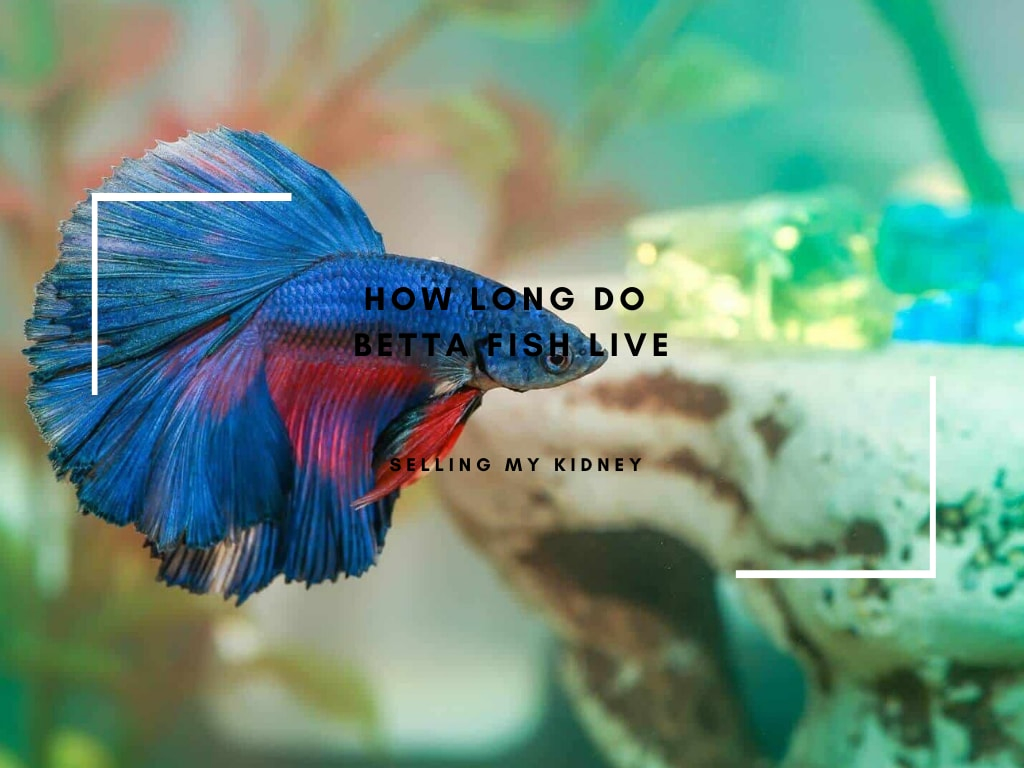Do you know how long a healthy betta lives?
There are so many misconceptions about betta that it can be difficult to separate fact from fiction. For one thing, some people think that it is normal for bettas to have short lifespans.
As with many other pets, it’s important to ask key questions – is this normal? Is there a difference between the life of bettas in captivity and in the wild?
With the longest living betta allegedly living for an entire decade, a lot of people ask what makes a betta thrive. Is there anything you can do to help your betta live longer?
How long do betta fish live in captivity?
In captivity, a betta fish is expected to live for up to three years. This is when they are given an adequate home and are properly taken care of.
How long do betta fish live in the wild?

In the wild, bettas tend to only live for approximately two years. There are several different factors which contribute to this diminished lifespan in comparison to bettas which are kept as pets.
This can be due to the problems of “wild living,” such as predation, starvation, and natural disasters. The
controlled conditions which aquarium keeping offer allow you to manage these events.
However, if you don’t take proper care of your betta, it could well have been better off in the wild.
How do I increase the lifespan of my betta fish?
Healthy betta

In order to increase the lifespan of your betta, you must put a lot of effort into keeping your fish happy and healthy.
Healthy bettas have more energy and vigor and will survive for longer periods of time. They are also stronger and can handle negative conditions better if these arise.
For example, a spike in ammonia or a fungal disease can spell trouble for the mortality of a betta. However, if they are healthy to begin with, they are better equipped to fight.
Appropriately sized tanks

Bettas are notorious for being marketed in criminally tiny setups. The cups which they are sold in are NOT adequate for them to live in.
The misconceptions arise from the fact that bettas can survive in such tight cups, but they don’t like cramped conditions at all. If you want your betta to thrive, you will must give it more space. A betta should be housed in an aquarium which has a volume of at least 2.5 gallons, but experts recommend that you actually do not house a betta in anything smaller than a 5-gallon tank, with 10-gallon tank is better choice.
After years of treating these fish as simply decorations shoved in tiny cups, many pet stores now advocate for larger spaces in their permanent homes. Check our Guide for Betta Tank here
Use heaters and filters
In addition to size, there are also a lot of misconceptions over what you should have installed in your betta setup.
Two pieces of equipment which must be considered are a filter (check SMK Blog Guide) and a heater (learn more). A filter can help keep the water quality pristine, particularly when opting for a smaller tank.
As these fish prefer their water a little bit on the warmer side, having a heater gives you more control.
While these things are, again, not essential to keep them alive, they are recommended measures which will increase the health (and potentially the longevity) of your betta.
Provide them with a good diet

Bettas have specific dietary requirements which shouldn’t be ignored. They are true carnivores, meaning that they require meat in their diets.
Do not simply feed your betta whatever food happens to be around your home. Food for carnivores is different to food for herbivores or omnivorous fish.
While you can simply check the back of the bottle to ensure that the formula is compatible with the natural diet of your betta fish, you should rather opt for proper betta food.
These pellets are created with the diet and behavior of the betta in mind. This means that the
food will also be small enough to fit in the betta’s small mouth and it will float.
This is important because, in the wild, a betta is more inclined to eat food which floats around on the surface of the water.
When the food sinks, they may not be as tempted to eat it and it can decay, which causes problems with the water quality.
A healthy betta diet goes beyond pellets and they can benefit from a little treat.
Live, thawed, or freeze-dried blood worms make a nutritious snack for a healthy betta. Just make sure not to overdo it and limit their snacks to once a week.
A proper diet can also help improve the color of their scales.
Use plants to provide oxygen
If you don’t want to use a bubbler for your betta tank, try adding some plants. This can make your tank look nicer while enhancing the overall quality of the water.
Keep the tank entertaining
Although your betta is not going to want a TV or music, enrichment is an important aspect of any successful aquarium design.
Bettas don’t require a lot to be entertained, but it is nice for them to at least have a plant to swim through, gravel to pick at, and somewhere to hide if they want to.
Avoid putting males together
As their name suggests, Siamese fighting fish are aggressive. If you put males together, they will fight each other.
In the wild, the fights are rather minimal, but selective breeding has created an incredibly feisty nature in the bettas which we keep in tanks.
Male bettas will fight until they really hurt each other – they may even kill one another. Bettas do not need to have friends to live with.
In fact, they generally cope better without any roommates. As naturally solitary animals, roommates can stress them out, as well as triggering their desire for combat.
How long can a betta fish live without food?
A betta can live without food for approximately 10 to 14 days. This in absolutely no way means that you should ever allow this to happen or starve your betta.
Experts recommend feeding your betta twice a day – occasionally giving your fish a day’s break from eating. While going a day or two without food is fine, pushing your betta to fast for longer than that isn’t healthy.
You also shouldn’t feed your fish “in advance” by leaving food in the tank. Instead, use a timed feeder
which will keep the food dry until it’s time for the fish to be fed.
How long can betta fish live in a 1-gallon tank bowl?

You might hear stories from people about how their bettas did fine and lived for many years in tiny
tanks. Don’t let these anecdotes convince you to put your fish in a tiny tank.
When fish are forced into smaller bowls, several factors bring their expected lifespans down to below the 3-year average.
How long can betta fish live in a bowl?
While the size of a tank is the real important factor, you may have noticed our use of the word “tank” rather than “bowl.”
While the shape of an aquarium doesn’t matter much for betta fish, bowls are often not fitted with filters or heaters.
Without these pieces of equipment, the health of your fish can be impacted and you can expect their lifespan to drop below the expected average.
Betta fish are a living animal. As their caretaker, you should make their home as comfortable and safe as possible, just as you would for any other pet.
Taking additional measures to keep their homes clean and ideal can help contribute to the longevity you can expect to see in your betta.
Do you have any stories about how you made your betta tank luxurious? Tell us about your experiences below.


